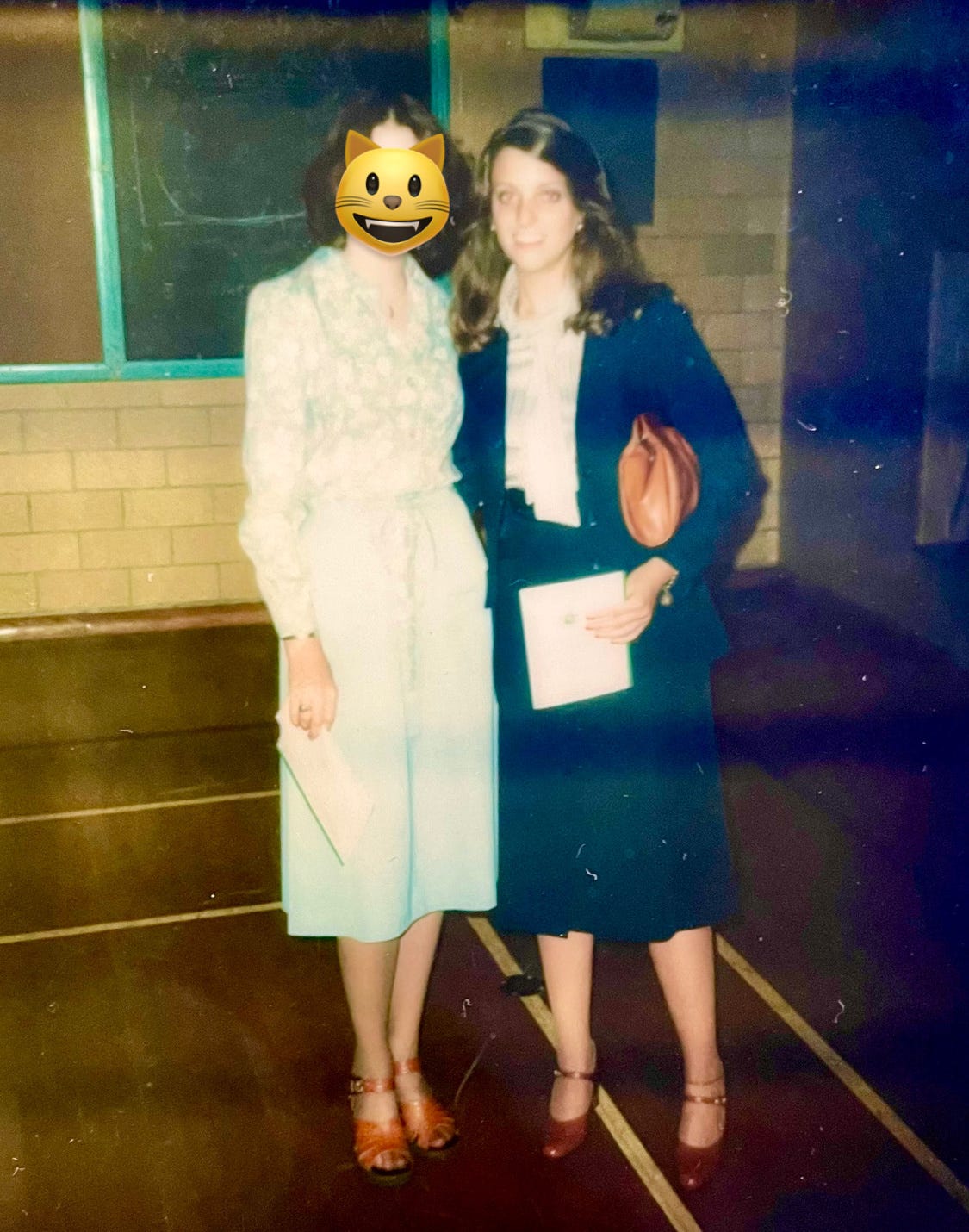Change. . . . for a Change (Part 1)
We’re living through some crazy times, folks, amiright? And, like it or not, change is a-comin’. But how to navigate all these seismic, historic shifts in our world?
I, like most people, would prefer things to stay the way they are. Actually, strike that: I would prefer things to stay the way they were: before Covid, before violent upheavals, before October 7, before our country became unrecognizable, before rifts in lifelong relationships. So, maybe, back to the late 70s?
Unfortunately, whatever my personal preferences, life is change. And I’ve undergone a handful of truly dramatic–even traumatic–changes in my life: when my dad disowned me, when my mom died, when my marriage shattered without warning, when I was diagnosed with candida overgrowth, when a dear friend was murdered by his wife.
Back when I struggled with candida symptoms that ravaged my skin, sinuses and digestive tract, I did what most people would do: I ignored it. Even worse, as someone who’d dealt with candida before, I already knew the solution: radically change my diet and lifestyle, basically removing all the food and drink I loved from my life. But knowing what to do didn’t matter.
In that instance, as in all the others, I began truly to change only when I had no other choice. Eventually, the physical symptoms became so severe that I could no longer ignore them; I literally couldn't function.
If I, a holistic nutritionist who knew exactly what was required to remedy a situation could resist change so dramatically, what does that say about all the other situations we encounter and why we don't make the changes we know would improve our lives in general?
Dealing with candida taught me a lot about change. I think it’s still relevant today, when we face so much upheaval in our lives. And I do believe that those who will come through the other side of all the chaos still intact are the ones who embrace change most effectively.
Here’s what I’ve learned over almost three decades about how--and why--we change. I wrote these principles originally in reference to my battle with candida, but they apply to almost every situation.
********************
So, what makes change so hard? Here are four reasons to consider.
I. Our brains are wired to avoid change and keep our lives the same.
What happens when you think about making a major (or even minor) change in your life, but invariably find you don't take the action necessary to implement that change?
We may think our conscious mind is in charge in these situations (ie, we simply "changed our mind"), but more likely we're being directed by the unconscious parts of the brain, particularly the amygdala (also known as the fear center) developed when we lived in caves and our survival was threatened on the regular.
Unlike today, back then we were all cavemen. If you found a safe haven hidden away from the saber-tooth tiger and providing shelter from storms, you tended to stay put in that residence. As humans, we’re wired to seek safety and stability, while shunning anything unusual or atypical (such as an unfamiliar shadow in the bushes). It's the amygdala that causes us to feel that way; its purpose is to keep us safe from harm.
In modern terms, however, the amygdala can actually impede positive change in your life, especially if you rely on just your own momentum to make the change.
Even when a situation feels negative, it’s still easier for us as humans to remain the same and deal with what is familiar rather than implement changes that could lead us into unfamiliar territory. (It’s that old saying, “Better the devil you know. . . “ et cetera).
This, in part, explains why so many people remain in loveless marriages rather than strike out on their own, or why you might have stuck with a job you hated for too long before seeking out other employment or starting that business you dreamed about for years.
In my case, it took a debilitating illness for me to change my eating habits and lifestyle, which ultimately led to a new life purpose and starting my own business. I literally waited until I had no choice--behavior that is quite common given our propensity to want things to stay the same.
None of the major changes in my life would have happened if I’d relied on my own dissatisfaction with my health (or my job or my relationship) to prompt those changes.
[Is it time to move yet?]
II. It's difficult to recognize that change might be helpful in your own life.
Precisely because we're wired to seek consistency and our brains like sameness, we tend to overlook or downplay situations in which change might even be beneficial.
As humans, it's really easy for us to become accustomed to a particular situation or behavior and it can be extremely difficult to envision things being different. Again, this is our overly protective brain telling us that change can be dangerous and we shouldn't rock the boat.
Let's say you're stuck in a situation with which you are less than happy, like a job with an overbearing, micro-managing boss. The natural tendency is to point out why this situation is necessary (and why you shouldn't change), as a way to avoid the harder decision of making a move away from the job--even if you're not completely satisfied with what you have.
"It's not so bad," you might think. "At least I have a secure paycheck and I can afford my mortgage. And if I moved somewhere else, who knows what might happen? It might even be worse. What if my new boss was a misogynist, or a racist, or worse?"--and so on. In this way, the notion of changing is not even perceived as something viable.
Similarly, once we establish a belief about ourselves--even a negative belief--it tends to stick with us and can be used as an excuse to avoid trying something new. "I'm just not good at math," you might think, "so there's no point considering that new managerial position, since it requires analyzing lots of statistics."
This same line of thinking occurs when we say things like "I'm too old," or "I can't afford it," or "I don't have the education I need for that." Our brains are constructed to find reasons to oppose change.
For me, it wasn't until I started working with a coach who helped me see clearly the path I wanted to pursue, and then pointed out many examples of people who had accomplished the same thing before me, starting at the same place (or with even less of a chance of success than I had).
If you feel stuck, one way out is to actively search for examples of others who started where you are now (or worse) and have accomplished what you desire (eg, someone older, with less money or less education who nevertheless achieved what you would like).
Sadly, without our own ability to recognize (or someone else to point out) alternatives, we far too often end up staying where we are, and nothing ever changes.
[Rakicevic Nenad on Pexels]
III. Change never happens without discomfort.
Let’s be real here: change can be hard. Like, really hard.
And if you truly want to enact positive and permanent change in your life, you'll need to navigate a period of discomfort on your way to the final destination.
As I mentioned, our brains want us to avoid change and will do whatever they can to convince us to remain stagnant. As a result, we tend to stay where we are unless forced by outside circumstances or people.
In my case, I simply couldn't ignore my symptoms any more. It got to the point where I was in constant pain and couldn't think straight. There was no way I could continue with my job or even my daily life, and I was spending all of my time either treating my symptoms or madly searching online for solutions. It finally occurred to me that was no way to live; and by then, I would have tried anything to be free of the constant itching, pain, fatigue and foggy thinking.
Just as physical discomfort is a signal that change needs to happen, I believe psychological discomfort is, too.
In other words, if you find yourself constantly uneasy, restless, angry or depressed for no apparent reason, it might be your mind telling you that a change could help.
I once worked with a client who came to see me because of physical symptoms that prevented her from participating in many of the activities she wanted to enjoy. Over time, however, it became clear that most of her negative feelings were a result of resentment at her job, where she was constantly asked to put in more hours and more work than her co-workers at the same level. Once she decided to change the way she responded to these requests and take back control of her own time, many of her symptoms subsided. As she clarified what she wanted and began to feel like she was happier emotionally, her body responded by improving as well.
Whatever kind of change you implement, working through it will always trigger discomfort; but it's important to keep focusing on what that change will bring on the "other side."
Learning to eat a completely different way, navigating social situations, talking to my family and friends about why I couldn't go out to eat with them, learning to treat my body differently--these were all supremely uncomfortable for me.
However, as Stephen Pressfield says in his book, The War of Art, at some point the pain of not changing becomes greater than the pain of changing. That's what happened to me.
Then, once I learned the skills necessary to maintain this lifestyle, everything became easy and natural, and I didn't have to think about it again. Today, I never ruminate over what food to eat or whether I'll be able to participate in social events that I'd like to be at. It's just no longer a concern.
[Back then, I was even teaching other people how easy it is to cook and eat this way!]
Think about the last time you learned a new skill or started a new hobby, one you continued to pursue: can you see how discomfort was part of that growth and change?
When you first learn to play the piano, for instance, every practice is excruciating and requires your full attention. But, keep at it--and before you realize it, one day you're pounding those keys without even being aware of what you're doing, and you’re transported by the music you create. That is the reward of weathering the discomfort of change.
If you can push yourself and persist through the initial uncomfortable period, you'll find that what awaits on the other side is more ease, freedom and joy.
IV. Even when we truly want the change, avoiding discomfort can be a stronger driver than the desire to change.
It's only natural that you would be averse to change, given how much your amygdala wants you to keep things exactly as they are. And even when we know on a conscious level that we want to change, the power of the discomfort as a result may be stronger than the desire to make the change in the first place.
Consequently, the vast majority of people won't initiate that change because they don't want to experience the discomfort. However, if you can persist through the initial uncomfortable period, you will reap the rewards of that new job, that new relationship, that new skill or that new diet.
What we need to do, then, is learn to override those impulses in the brain, so we can move forward voluntarily instead of waiting (like I did) until we have no choice. For me, this learning came through working with my coach, who not only taught me skills to help me override those primitive instincts, but also taught me other strategies that made the process of change easier and smoother.
Part two will address the many ways we subconsciously sabotage the process of change, and what we can do to override some of the natural instincts keeping us stuck where we are.
********************
As always, thank you for reading. If you enjoyed this article, please share it with someone else! Or consider supporting me and my writing by subscribing with a paid or free subscription or a one-time donation (see button below). I’ll be eternally grateful in any case!
*******************




